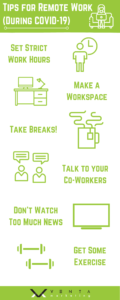We are over halfway through 2020, and for the majority of the year, COVID-19 has completely changed everyday life — including the work landscape. A poll conducted by Gallup back in May estimated that nearly 70 percent of U.S. employees were working remotely in some type of capacity.
As technology has continued to increase in capability and accessibility over the past several decades, more Americans have slowly shifted out of the office and into the home. However, due to the ongoing global pandemic, many businesses and employees have been forced to adjust to a new working environment that they may not have been used to before. In an effort to better protect their team members and communities, businesses that are capable, have moved their operations to at-home kitchen tables, couches, and patio chairs.
If you’re not used to it, working from home can definitely throw a wrench in your routine and everyday workflow. From the interruptions of pets and children to the lack of a dedicated workspace, not being in the office can pose its own set of challenges. With that being said, it appears that many Americans are learning to adjust on the fly to their new work environments, and even developing new skills and communication techniques.
But if you’re still working towards achieving your work from home “nirvana,” here are some tips to help you remain productive, efficient, motivated, and healthy during this unprecedented time.

Set Defined Work Hours
When working in an office you have pretty clear working hours, like 9 to 5, for example. When you work from home, it is easy for those lines to become blurred. Instead of a rigid schedule, the flexibility enables you to work off-hours or continuing to put in more hours than you typically would.
“Oh just one more email. It won’t hurt anything.” Next thing you know it’s 8 PM and you haven’t had dinner. Setting defined work hours helps give your co-workers a clear set of hours that you are available, and also helps protect your mental health from burnout and exhaustion.
Find a Dedicated Workspace
Using the same workspace at home helps bring structure and routine to your day. It helps get you in the right headspace by communicating that this is “my work time.” With an everyday work station, you are able to become less deterred by all the outside distractions that accompany home work life.
Take Breaks — Seriously
Just because you might be more comfortable in that chair at home doesn’t mean you don’t need breaks throughout the day. The mind can only handle so much concentration and mental output during the course of a day. Therefore, remember to step away from the computer and go for a short walk or finally fold that laundry that is sitting on the edge of your bed. These intermitted breaks help rejuvenate your mind and body, while also being a possible source of inspiration.
Most importantly, don’t forget to feed yourself! Take that lunch break and fuel up for the second half of your work day.
Seek Out Communication
While working from home can be a nice break from a crowded office, humans are social creatures at the end of the day. It is easy to quickly become isolated from your peers when working from home. To combat this, it is important to communicate with your colleagues as if you were standing at the office water cooler.
These short interactions about work frustrations, personal life stories, and overheard jokes are essential to your work satisfaction. The majority of us enjoy our work, in part because of our co-workers. So don’t forget to schedule a quick 15 minute Google Hangouts call or blow up their Slack with a funny life update.
Don’t Get Sucked Into The News
The world has a lot going on right now, and the media can add a lot of fuel to the fire. It is important to stay informed, but getting too emotionally invested or watching the news on repeat can really affect your mental and emotional health. When life lacks a lot of normalcy, getting too involved with the news headlines can further exacerbate the hopelessness and fear we may have lingering in the back of our minds. So turn off the TV.
Exercise!
This isn’t a healthcare blog, but during this time (and all the time) regular exercise is critical to keeping a strong immune system and maintaining your mental and emotional health. At-home workouts are enough to keep your body moving, reduce stress, promote better sleep, and help prevent back pain from creeping up.
